By David Pan · Monday, September 26, 2022 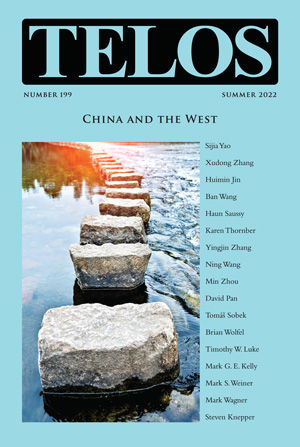 By appealing to our common humanity, the idea of human rights and the idea of a “community of common destiny for mankind” promoted by the Chinese Communist Party seem to be referring to the same thing. Yet the two ideas are clearly opposed to each other, since the goal of the second idea is to supplant the first one. By opposing the idea of human rights and an existing international order that values the autonomy of nation-states and the rule of law, the Chinese Communist Party’s version of common humanity envisions a subordination of international order to Chinese power. One response to these opposing views of the meaning of common humanity would be to deny that such an idea might have any legitimacy at all and to then conclude that the only commonality we share would be a will to power. This stance, by denying the possibility of a common set of values, would undermine attempts at cultural exchange and comparison, as well as the legitimacy of any critique. The human rights ideal, by contrast, begins with recognizing, at a minimum, those transgressions that all humans seek to avoid, including torture, genocide, and enslavement. Such agreement provides the first step for a cultural comparison, which cannot begin until we define a common value. By defining such a value, it becomes possible to compare different manifestations of that value as well as to formulate a critique. In a follow-up to last week’s podcast with Sijia Yao, this week’s podcast with Xudong Zhang addresses the role of the idea of a common humanity for establishing the parameters of a cultural comparison between China and the West. By appealing to our common humanity, the idea of human rights and the idea of a “community of common destiny for mankind” promoted by the Chinese Communist Party seem to be referring to the same thing. Yet the two ideas are clearly opposed to each other, since the goal of the second idea is to supplant the first one. By opposing the idea of human rights and an existing international order that values the autonomy of nation-states and the rule of law, the Chinese Communist Party’s version of common humanity envisions a subordination of international order to Chinese power. One response to these opposing views of the meaning of common humanity would be to deny that such an idea might have any legitimacy at all and to then conclude that the only commonality we share would be a will to power. This stance, by denying the possibility of a common set of values, would undermine attempts at cultural exchange and comparison, as well as the legitimacy of any critique. The human rights ideal, by contrast, begins with recognizing, at a minimum, those transgressions that all humans seek to avoid, including torture, genocide, and enslavement. Such agreement provides the first step for a cultural comparison, which cannot begin until we define a common value. By defining such a value, it becomes possible to compare different manifestations of that value as well as to formulate a critique. In a follow-up to last week’s podcast with Sijia Yao, this week’s podcast with Xudong Zhang addresses the role of the idea of a common humanity for establishing the parameters of a cultural comparison between China and the West.
Continue reading →
By Alex Dubilet · Friday, December 18, 2015 A miasma of exhaustion and obsolescence pervades Michel Houellebecq’s Submission. It is occasionally punctured by explicit expressions of a pornographic libidinality, but these, in the end, serve only as desperate manifestations of increasingly temporary respites. The end is nigh, if it didn’t already happen. Houellebecq’s universe remains what it has been repeatedly—a universe of male libidinal desire, its intensifying frustrations and anxieties monumentally projected onto the background of the specters of the civilizational decline of the West. Houellebecq is at the tired end of the secular liberal dream of possessive individualism and sexual freedom, or, as the narrator puts it rather succinctly: “In the end, my cock was all I had” (81).
Continue reading →
By Joseph van der Naald · Wednesday, December 3, 2014 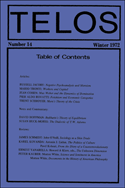 Mario Tronti’s postscript to the second edition of his publication Operai e Capitale, published in Telos in 1972 as “Workers and Capital,” provides the reader with a summation of his thought on the development of the “mass worker,” presented through an analysis of notable labor struggles across the Western world. Tronti’s methodology, which he briefly explicates at the beginning of the piece, delineates certain historical workers’ struggles in order to examine “macroscopic groups of facts yet untouched by the critical consciousness of labor thought” (25). His purpose is to yield “an historical model, a privileged period of research” (25) so as to better analyze the emergence of the autonomy of the working class engaged in a dialectical struggle with capital. Mario Tronti’s postscript to the second edition of his publication Operai e Capitale, published in Telos in 1972 as “Workers and Capital,” provides the reader with a summation of his thought on the development of the “mass worker,” presented through an analysis of notable labor struggles across the Western world. Tronti’s methodology, which he briefly explicates at the beginning of the piece, delineates certain historical workers’ struggles in order to examine “macroscopic groups of facts yet untouched by the critical consciousness of labor thought” (25). His purpose is to yield “an historical model, a privileged period of research” (25) so as to better analyze the emergence of the autonomy of the working class engaged in a dialectical struggle with capital.
Continue reading →
By Yonathan Listik · Tuesday, April 23, 2013
As an occasional feature on TELOSscope, we highlight a past Telos article whose critical insights continue to illuminate our thinking and challenge our assumptions. Today, Yonathan Listik looks at Cornelius Castoriadis’s “Socialism and Autonomous Society,” from Telos 43 (Spring 1980).
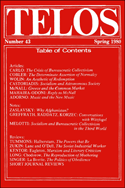 Cornelius Castoriadis’s opening line in “Socialism and Autonomous Society”—”Henceforth, the terms ‘socialism’ and ‘communism’ will have to be abandoned”—clearly indicate that he is breaking with orthodox Marxism. But one must not rush to a conclusion since upon closer inspection the dissonances are not that relevant to Marx’s overall project as presented by Castoriadis. His criticism of notions such as the “dictatorship of the proletariat” could automatically place him outside the Marxist discourse. Nevertheless he manages to illustrate, even within orthodox Marxism, the minor position of canonical notions, compared to Marx’s essential project of an autonomous society: a society composed of free and sovereign people. Cornelius Castoriadis’s opening line in “Socialism and Autonomous Society”—”Henceforth, the terms ‘socialism’ and ‘communism’ will have to be abandoned”—clearly indicate that he is breaking with orthodox Marxism. But one must not rush to a conclusion since upon closer inspection the dissonances are not that relevant to Marx’s overall project as presented by Castoriadis. His criticism of notions such as the “dictatorship of the proletariat” could automatically place him outside the Marxist discourse. Nevertheless he manages to illustrate, even within orthodox Marxism, the minor position of canonical notions, compared to Marx’s essential project of an autonomous society: a society composed of free and sovereign people.
Continue reading →
By J. F. Dorahy · Tuesday, April 16, 2013 As an occasional feature on TELOSscope, we highlight a past Telos article whose critical insights continue to illuminate our thinking and challenge our assumptions. Today, J. F. Dorahy looks at Joel Whitebook’s “Saving the Subject: Modernity and the Problem of the Autonomous Individual,” from Telos 50 (Winter 1981).
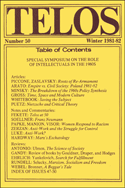 Autonomy is, arguably, the most fundamental concept in the discursive constellation of modernity. If it is apposite, and I believe it is, to think in terms of the differentiation between political, socio-economic, and cultural modernities, then it is clear that the concept of autonomy—either with reference to the autonomous individual or the autonomous work of art—is a constitutive force within each sphere. In “Saving the Subject: Modernity and the Problem of the Autonomous Individual,” Joel Whitebook offers a historically nuanced overview of the difficulties involved in thinking the “autonomous individual” under the conditions of a dynamic and increasingly complex modernity. Whitebook’s piece is wide-ranging and fuses a deep psychoanalytic insight with a robust sociological consciousness: a fusion that accompanies, to my mind, the best critical theory. To be sure, the many subtleties and divergences that emerge from Whitebook’s dialectic are resistant to a full reconstruction within this preview. Rather, I would like to simplify Whitebook’s account by drawing out the three historical epochs examined by Whitebook and say a few things regarding the key aspects of Whitebook’s reading of Marx and Freud and Adorno and Habermas as thinkers who most significantly appreciate the problematic nature of the modern, autonomous individual. Finally, I conclude by arguing for the innovative character of Whitebook’s thoughts regarding the centrality of affective relationships in the formation of the autonomous individual. Autonomy is, arguably, the most fundamental concept in the discursive constellation of modernity. If it is apposite, and I believe it is, to think in terms of the differentiation between political, socio-economic, and cultural modernities, then it is clear that the concept of autonomy—either with reference to the autonomous individual or the autonomous work of art—is a constitutive force within each sphere. In “Saving the Subject: Modernity and the Problem of the Autonomous Individual,” Joel Whitebook offers a historically nuanced overview of the difficulties involved in thinking the “autonomous individual” under the conditions of a dynamic and increasingly complex modernity. Whitebook’s piece is wide-ranging and fuses a deep psychoanalytic insight with a robust sociological consciousness: a fusion that accompanies, to my mind, the best critical theory. To be sure, the many subtleties and divergences that emerge from Whitebook’s dialectic are resistant to a full reconstruction within this preview. Rather, I would like to simplify Whitebook’s account by drawing out the three historical epochs examined by Whitebook and say a few things regarding the key aspects of Whitebook’s reading of Marx and Freud and Adorno and Habermas as thinkers who most significantly appreciate the problematic nature of the modern, autonomous individual. Finally, I conclude by arguing for the innovative character of Whitebook’s thoughts regarding the centrality of affective relationships in the formation of the autonomous individual.
Continue reading →
By Pekka Sulkunen · Friday, October 21, 2011 Pekka Sulkunen’s “Autonomy against Intimacy: On the Problem of Governing Lifestyle-Related Risks” appears in Telos 156 (Fall 2011). Read the full version online at the TELOS Online website, or purchase a print copy of the issue here.
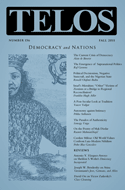 Most risk society analyses focus on external risks caused by production, neglecting internal risks produced by consumption. Tobacco, alcohol, obesity, lack of exercise, and other lifestyle-related causes are top global burdens of health, growing with emerging consumer society outside western capitalism. Modern societies have a poor track record in regulating these risks. Neo-liberal hegemony is a weak explanation of the failure. We must see the issue as a problem of justification. Modern social order is founded on individual biography, autonomy, and intimacy as principles of human worth. The twentieth-century modern state has guided the progress to make these ideals reality. Autonomy, the right to individual self-control, has supported the right to intimacy, experience of life as unique and separate from other lives. Today, only quite recently, these principles of worth are fully matured, but autonomy and intimacy are now conflicting. One person’s uniqueness—the pleasure of consumption or cultural identity—is felt to tax the autonomy of others. Vice versa, the autonomy of the majority cuts into the uniqueness of the few. The state has lost its pastoral role to lead the flock to progress, and become apostolic authority merely instructing the faithful on health, security, and well-being from a distance. Most risk society analyses focus on external risks caused by production, neglecting internal risks produced by consumption. Tobacco, alcohol, obesity, lack of exercise, and other lifestyle-related causes are top global burdens of health, growing with emerging consumer society outside western capitalism. Modern societies have a poor track record in regulating these risks. Neo-liberal hegemony is a weak explanation of the failure. We must see the issue as a problem of justification. Modern social order is founded on individual biography, autonomy, and intimacy as principles of human worth. The twentieth-century modern state has guided the progress to make these ideals reality. Autonomy, the right to individual self-control, has supported the right to intimacy, experience of life as unique and separate from other lives. Today, only quite recently, these principles of worth are fully matured, but autonomy and intimacy are now conflicting. One person’s uniqueness—the pleasure of consumption or cultural identity—is felt to tax the autonomy of others. Vice versa, the autonomy of the majority cuts into the uniqueness of the few. The state has lost its pastoral role to lead the flock to progress, and become apostolic authority merely instructing the faithful on health, security, and well-being from a distance.
Continue reading →
|
|
 By appealing to our common humanity, the idea of human rights and the idea of a “community of common destiny for mankind” promoted by the Chinese Communist Party seem to be referring to the same thing. Yet the two ideas are clearly opposed to each other, since the goal of the second idea is to supplant the first one. By opposing the idea of human rights and an existing international order that values the autonomy of nation-states and the rule of law, the Chinese Communist Party’s version of common humanity envisions a subordination of international order to Chinese power. One response to these opposing views of the meaning of common humanity would be to deny that such an idea might have any legitimacy at all and to then conclude that the only commonality we share would be a will to power. This stance, by denying the possibility of a common set of values, would undermine attempts at cultural exchange and comparison, as well as the legitimacy of any critique. The human rights ideal, by contrast, begins with recognizing, at a minimum, those transgressions that all humans seek to avoid, including torture, genocide, and enslavement. Such agreement provides the first step for a cultural comparison, which cannot begin until we define a common value. By defining such a value, it becomes possible to compare different manifestations of that value as well as to formulate a critique. In a follow-up to last week’s podcast with Sijia Yao, this week’s podcast with Xudong Zhang addresses the role of the idea of a common humanity for establishing the parameters of a cultural comparison between China and the West.
By appealing to our common humanity, the idea of human rights and the idea of a “community of common destiny for mankind” promoted by the Chinese Communist Party seem to be referring to the same thing. Yet the two ideas are clearly opposed to each other, since the goal of the second idea is to supplant the first one. By opposing the idea of human rights and an existing international order that values the autonomy of nation-states and the rule of law, the Chinese Communist Party’s version of common humanity envisions a subordination of international order to Chinese power. One response to these opposing views of the meaning of common humanity would be to deny that such an idea might have any legitimacy at all and to then conclude that the only commonality we share would be a will to power. This stance, by denying the possibility of a common set of values, would undermine attempts at cultural exchange and comparison, as well as the legitimacy of any critique. The human rights ideal, by contrast, begins with recognizing, at a minimum, those transgressions that all humans seek to avoid, including torture, genocide, and enslavement. Such agreement provides the first step for a cultural comparison, which cannot begin until we define a common value. By defining such a value, it becomes possible to compare different manifestations of that value as well as to formulate a critique. In a follow-up to last week’s podcast with Sijia Yao, this week’s podcast with Xudong Zhang addresses the role of the idea of a common humanity for establishing the parameters of a cultural comparison between China and the West.  Mario Tronti’s postscript to the second edition of his publication Operai e Capitale, published in Telos in 1972 as “Workers and Capital,” provides the reader with a summation of his thought on the development of the “mass worker,” presented through an analysis of notable labor struggles across the Western world. Tronti’s methodology, which he briefly explicates at the beginning of the piece, delineates certain historical workers’ struggles in order to examine “macroscopic groups of facts yet untouched by the critical consciousness of labor thought” (25). His purpose is to yield “an historical model, a privileged period of research” (25) so as to better analyze the emergence of the autonomy of the working class engaged in a dialectical struggle with capital.
Mario Tronti’s postscript to the second edition of his publication Operai e Capitale, published in Telos in 1972 as “Workers and Capital,” provides the reader with a summation of his thought on the development of the “mass worker,” presented through an analysis of notable labor struggles across the Western world. Tronti’s methodology, which he briefly explicates at the beginning of the piece, delineates certain historical workers’ struggles in order to examine “macroscopic groups of facts yet untouched by the critical consciousness of labor thought” (25). His purpose is to yield “an historical model, a privileged period of research” (25) so as to better analyze the emergence of the autonomy of the working class engaged in a dialectical struggle with capital.  Cornelius Castoriadis’s opening line in “Socialism and Autonomous Society”—”Henceforth, the terms ‘socialism’ and ‘communism’ will have to be abandoned”—clearly indicate that he is breaking with orthodox Marxism. But one must not rush to a conclusion since upon closer inspection the dissonances are not that relevant to Marx’s overall project as presented by Castoriadis. His criticism of notions such as the “dictatorship of the proletariat” could automatically place him outside the Marxist discourse. Nevertheless he manages to illustrate, even within orthodox Marxism, the minor position of canonical notions, compared to Marx’s essential project of an autonomous society: a society composed of free and sovereign people.
Cornelius Castoriadis’s opening line in “Socialism and Autonomous Society”—”Henceforth, the terms ‘socialism’ and ‘communism’ will have to be abandoned”—clearly indicate that he is breaking with orthodox Marxism. But one must not rush to a conclusion since upon closer inspection the dissonances are not that relevant to Marx’s overall project as presented by Castoriadis. His criticism of notions such as the “dictatorship of the proletariat” could automatically place him outside the Marxist discourse. Nevertheless he manages to illustrate, even within orthodox Marxism, the minor position of canonical notions, compared to Marx’s essential project of an autonomous society: a society composed of free and sovereign people.  Autonomy is, arguably, the most fundamental concept in the discursive constellation of modernity. If it is apposite, and I believe it is, to think in terms of the differentiation between political, socio-economic, and cultural modernities, then it is clear that the concept of autonomy—either with reference to the autonomous individual or the autonomous work of art—is a constitutive force within each sphere. In “Saving the Subject: Modernity and the Problem of the Autonomous Individual,” Joel Whitebook offers a historically nuanced overview of the difficulties involved in thinking the “autonomous individual” under the conditions of a dynamic and increasingly complex modernity. Whitebook’s piece is wide-ranging and fuses a deep psychoanalytic insight with a robust sociological consciousness: a fusion that accompanies, to my mind, the best critical theory. To be sure, the many subtleties and divergences that emerge from Whitebook’s dialectic are resistant to a full reconstruction within this preview. Rather, I would like to simplify Whitebook’s account by drawing out the three historical epochs examined by Whitebook and say a few things regarding the key aspects of Whitebook’s reading of Marx and Freud and Adorno and Habermas as thinkers who most significantly appreciate the problematic nature of the modern, autonomous individual. Finally, I conclude by arguing for the innovative character of Whitebook’s thoughts regarding the centrality of affective relationships in the formation of the autonomous individual.
Autonomy is, arguably, the most fundamental concept in the discursive constellation of modernity. If it is apposite, and I believe it is, to think in terms of the differentiation between political, socio-economic, and cultural modernities, then it is clear that the concept of autonomy—either with reference to the autonomous individual or the autonomous work of art—is a constitutive force within each sphere. In “Saving the Subject: Modernity and the Problem of the Autonomous Individual,” Joel Whitebook offers a historically nuanced overview of the difficulties involved in thinking the “autonomous individual” under the conditions of a dynamic and increasingly complex modernity. Whitebook’s piece is wide-ranging and fuses a deep psychoanalytic insight with a robust sociological consciousness: a fusion that accompanies, to my mind, the best critical theory. To be sure, the many subtleties and divergences that emerge from Whitebook’s dialectic are resistant to a full reconstruction within this preview. Rather, I would like to simplify Whitebook’s account by drawing out the three historical epochs examined by Whitebook and say a few things regarding the key aspects of Whitebook’s reading of Marx and Freud and Adorno and Habermas as thinkers who most significantly appreciate the problematic nature of the modern, autonomous individual. Finally, I conclude by arguing for the innovative character of Whitebook’s thoughts regarding the centrality of affective relationships in the formation of the autonomous individual.  Most risk society analyses focus on external risks caused by production, neglecting internal risks produced by consumption. Tobacco, alcohol, obesity, lack of exercise, and other lifestyle-related causes are top global burdens of health, growing with emerging consumer society outside western capitalism. Modern societies have a poor track record in regulating these risks. Neo-liberal hegemony is a weak explanation of the failure. We must see the issue as a problem of justification. Modern social order is founded on individual biography, autonomy, and intimacy as principles of human worth. The twentieth-century modern state has guided the progress to make these ideals reality. Autonomy, the right to individual self-control, has supported the right to intimacy, experience of life as unique and separate from other lives. Today, only quite recently, these principles of worth are fully matured, but autonomy and intimacy are now conflicting. One person’s uniqueness—the pleasure of consumption or cultural identity—is felt to tax the autonomy of others. Vice versa, the autonomy of the majority cuts into the uniqueness of the few. The state has lost its pastoral role to lead the flock to progress, and become apostolic authority merely instructing the faithful on health, security, and well-being from a distance.
Most risk society analyses focus on external risks caused by production, neglecting internal risks produced by consumption. Tobacco, alcohol, obesity, lack of exercise, and other lifestyle-related causes are top global burdens of health, growing with emerging consumer society outside western capitalism. Modern societies have a poor track record in regulating these risks. Neo-liberal hegemony is a weak explanation of the failure. We must see the issue as a problem of justification. Modern social order is founded on individual biography, autonomy, and intimacy as principles of human worth. The twentieth-century modern state has guided the progress to make these ideals reality. Autonomy, the right to individual self-control, has supported the right to intimacy, experience of life as unique and separate from other lives. Today, only quite recently, these principles of worth are fully matured, but autonomy and intimacy are now conflicting. One person’s uniqueness—the pleasure of consumption or cultural identity—is felt to tax the autonomy of others. Vice versa, the autonomy of the majority cuts into the uniqueness of the few. The state has lost its pastoral role to lead the flock to progress, and become apostolic authority merely instructing the faithful on health, security, and well-being from a distance. 






